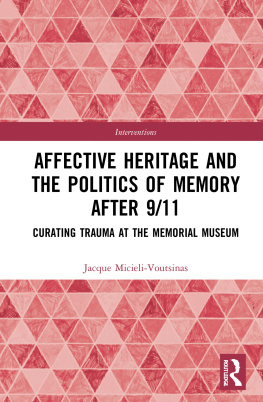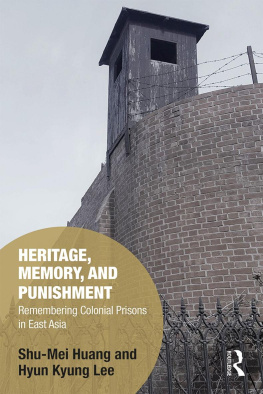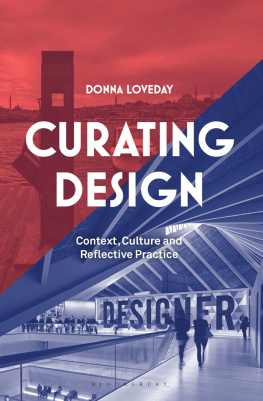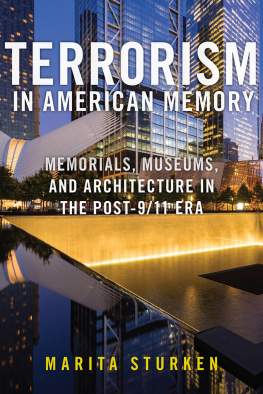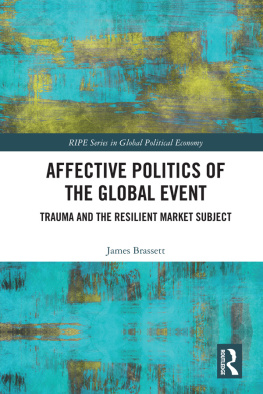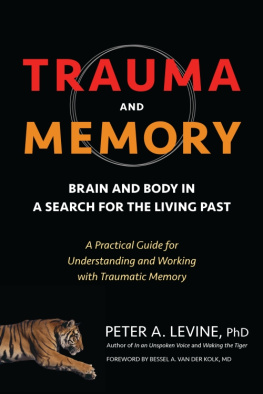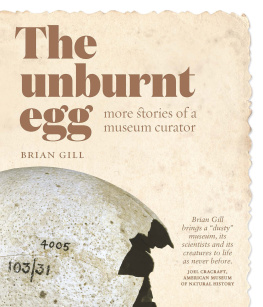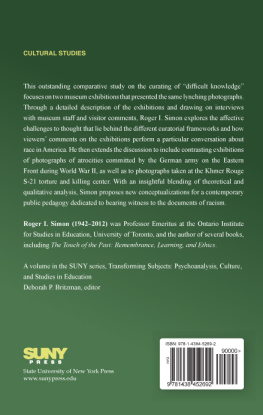Affective Heritage and the Politics of Memory after 9/11
This book critically examines the institutional curation of traumatic memory at the 9/11 Memorial Museum and its evocative power as a cultural storyteller.
Memorial museums are evocative spaces. Drawing on aesthetic practices deeply rooted in representing the unrepresentability of cultural trauma, most notably the Holocaust, memorial museums are powerful, popular mediums for establishing cultural values, asking the visitor to contemplate Who am I? in relation to the difficult histories on display. Using primary data, this book poses important questions about the emotionally charged site: what moral lessons are visitors imparted with at the 9/11 Memorial Museum? Who is the cultural institutions primary audiencethe imagined community it reconstructs this traumatic history and safeguards its memories for? What does the National September 11 Memorial & Museum ultimately teach visitors about history, ourselves, and others?
This work will be of interest to students and scholars in the areas of Human Geography, American Studies, Museum Studies and Public History, Cultural and Heritage Studies, and Trauma and Memory Studies.
Jacque Micieli-Voutsinas is an Assistant Professor of Museum Studies and Public History at the University of Central Oklahoma, where she also directs the Graduate Program in Museum Studies. She is co-editor of Affective Architectures: More-Than-Representational Geographies of Heritage (Routledge 2021).
Interventions
The Series provides a forum for innovative and interdisciplinary work that engages with alternative critical, post-structural, feminist, postcolonial, psychoanalytic and cultural approaches to international relations and global politics. In our first 5 years we have published 60 volumes.
We aim to advance understanding of the key areas in which scholars working within broad critical post-structural traditions have chosen to make their interventions, and to present innovative analyses of important topics. Titles in the series engage with critical thinkers in philosophy, sociology, politics and other disciplines and provide situated historical, empirical and textual studies in international politics.
We are very happy to discuss your ideas at any stage of the project: just contact us for advice or proposal guidelines. Proposals should be submitted directly to the Series Editors:
As Michel Foucault has famously stated, knowledge is not made for understanding; it is made for cutting In this spirit The Edkins Vaughan-Williams Interventions series solicits cutting edge, critical works that challenge mainstream understandings in international relations. It is the best place to contribute post disciplinary works that think rather than merely recognize and affirm the world recycled in IRs traditional geopolitical imaginary.
Michael J. Shapiro, University of Hawaii at Manoa, USA
Edited by Jenny Edkins, Aberystwyth University and Nick Vaughan-Williams, University of Warwick
Everyday Border Struggles
Segregation and Solidarity in the UK and Calais
Thom Tyerman
For more information about this series, please visit: https://www.routledge.com/Routledge-Studies-in-Genocide-and-Crimes-against-Humanity/book-series/RSGCH
First published 2021
by Routledge
2 Park Square, Milton Park, Abingdon, Oxon OX14 4RN
and by Routledge
52 Vanderbilt Avenue, New York, NY 10017
Routledge is an imprint of the Taylor & Francis Group, an informa business
2021 Jacque Micieli-Voutsinas
The right of Jacque Micieli-Voutsinas to be identified as author of this work has been asserted by her in accordance with sections 77 and 78 of the Copyright, Designs and Patents Act 1988.
All rights reserved. No part of this book may be reprinted or reproduced or utilised in any form or by any electronic, mechanical, or other means, now known or hereafter invented, including photocopying and recording, or in any information storage or retrieval system, without permission in writing from the publishers.
Trademark notice: Product or corporate names may be trademarks or registered trademarks, and are used only for identification and explanation without intent to infringe.
British Library Cataloguing-in-Publication Data
A catalogue record for this book is available from the British Library
Library of Congress Cataloging-in-Publication Data
A catalog record has been requested for this book
ISBN: 978-1-138-09730-8 (hbk)
ISBN: 978-0-367-75138-8 (pbk)
ISBN: 978-1-315-10496-6 (ebk)
Typeset in Times New Roman
by codeMantra
for a more peaceful tomorrow
The traumatic nature of the September 11th terror attacks shook most Americans to the core. US vulnerability had been exposed for the first time since Pearl Harbor, reigniting sentiments of insecurity and paranoia unparalleled since the Cold War, and a nostalgia for safer times no longer discernable through the dust of the fallen buildings. The events transformed New York City into a wounded landscape representative of a collective cultural loss (see Harvey 2003; Till 2012), newly symbolized by missing buildings and people, and a fractured skyline. As this collective sense of grief emanated outward, reverberating from Lower Manhattan to the regional, national, and global audiences that watched on, establishing an appropriate memorial became a necessary first step toward mending this collective wound (see E. A. Kaplan 2005).
Michael Arad, the winning architect of the World Trade Center memorial design competition (held 20032004), recalled what inspired his design, Reflecting Absence, in a public speaking engagement. Arad reminisced about staring out toward the Hudson River from the roof of his apartment building, days after the terror attack, lamenting the massive voids where the Twin Towers once stood. Articulating his vision for the memorial pools as voids never filling up where the surface of the water was torn open, where a secondary void yawns forever, remains forever empty so that you cannot see the bottom, Arad conceptualized the commemorative site as both an architectural and emotional wound (Arad 2012, italics mine).
The twin voids in New York City manifested as a wound on the national body-politic and collective, cultural psyche. According to Western etymology, trauma was first conceived as a physical wound on the body (Greenberg 2003). Modern psychologists have since theorized trauma as emotional, or psychic, wounding (see Caruth 1996). Traumatic wounds, according to Cathy Caruth (1995), manifest as unknowable voids, unassimilable into the psyche. Arads aestheticization of the former Trade Towers transformed unknowable voids into a traumascape: space of and for encountering the traumatic past (Tumarkin 2005), marking a significant step in the official curation of the cultural trauma known as 9/11.
The 9/11 Memorial & Museum is one of the highest-profile cultural destinations in recent memory, yet remains one of the least theorized.9/11 Memorial & Museum, also known as the National September 11 Memorial & Museum, has since welcomed more than 50 million visitors to collectively bear witness to the violence of the attacks and mourn its victims, to understand the threat of global terrorism, and to learn the history of the 9/11-terrorist plot against the United States government. But how does this cultural institution represent an event that has been called unrepresentable by so many? How does it assist a community, a nationstill reeling in a post-September 11th waketo make sense of something that, for many, remains nonsensical? What does it mean to remember 9/11 amidst an ongoing war, a war that is effectively waged in its name?

